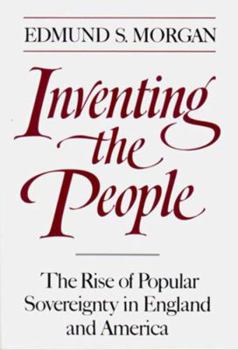Inventing the People: The Rise of Popular Sovereignty in England and America
Select Format
Select Condition 
Book Overview
This book makes the provocative case here that America has remained politically stable because the Founding Fathers invented the idea of the American people and used it to impose a government on the new nation. His landmark analysis shows how the notion of popular sovereignty--the unexpected offspring of an older, equally fictional notion, the divine right of kings--has worked in our history and remains a political force today.
Format:Paperback
Language:English
ISBN:0393306232
ISBN13:9780393306231
Release Date:September 1989
Publisher:W. W. Norton & Company
Length:320 Pages
Weight:0.74 lbs.
Dimensions:0.9" x 5.0" x 8.0"
Customer Reviews
3 ratings
The People - a convenient fiction
Published by Thriftbooks.com User , 18 years ago
This book is a very perceptive examination of a central tenet of both the British and American democracies, that is, the one where the central government rests on popular sovereignty - on the people. The author shows that is mostly a convenient fiction, but one that must be honored to legitimate democratic governments. In the first place, "the people" is a most nebulous concept - sufficiently vague to not affix specific rights and duties. The author devotes at least half the book to 17th century English political history where the divine right of kings was gradually replaced by popular sovereignty exercised by Parliament. He shows where the Long Parliament of 1640 assumed supreme authority in the name of the people with no mechanisms actually in place for the "people" to check Parliament. The Levellers of that time attempted to bridge the gap of empowerment for the people, but were essentially ignored and suppressed keeping power in the hands of the few. In later years and in America, the myth of the power of people has been sustained in many ways: extolling the importance of the virtuous yeoman (farmer), requiring participation in local militias where local social hierarchies can be reinforced, elections where pre-selected, elite candidates pander for votes, and holding carnivals where the gentry and peasants pretend to swap social roles. In all of these cases there is the pretense of social equality. It is all an elaborate game where elites interact with the ordinary just enough to remind everyone both of their superiority and sameness and to deflect grass-roots efforts to exercise power. There is a great deal of discussion concerning the agreement of men in a hypothetical past to emerge from a state of nature to form a community and then to establish a government. In theory the community of men retains its superiority over the government, but the problem is that once power is invested in representatives, presidents, judges, etc, how can the people regain the upper hand. In America, Constitution writing was a pre-government community activity that prescribed a government and had to be ratified by state conventions of the people. The author points out that during the time of the Glorious Revolution of 1688 in England, the Convention (actually Parliament) was unwilling to return to a pre-government state to construct a constitution - too much chance for actual people's voices. Since the time of the founding much has changed in America. Landed elites have long since been surpassed by business and financial elites. The rise of mass communications while increasing information flows also facilitates the ability to sustain all manner of myths including the myth of popular empowerment. This is a good book to understand that some key political myths in this country have been with us a long time.
A Great Book to Understand our Forefathers
Published by Thriftbooks.com User , 19 years ago
I'm barely a quarter of the way through the book. It's very dense in that there is so much to read and ponder within its covers. But what I have read shows that he has done his homework, and is presenting the material in a way that makes me feel like I was part of the popular debate occuring in the halls of government at the time. If you want to know why the constitution is written the way it is, where our forefathers got the crazy idea that men are inherently sovereign and have God-given rights, you'll need to get this book. It explains the slow, awkward, and surprising evolution of philosophy as people began to realize kings were no more endowed with a a mandate from God than men were. If you can't imagine what was really going on in people's minds between the Magna Carta and the Declaration of Independence, this book will fill in all of the missing gaps.
Getting back to basics, civicly speaking
Published by Thriftbooks.com User , 22 years ago
We the People, right? Well, it's not obvious anymore, looking around at the usurping of many of our rights. This book states the obvious in simple terms that we can all understand at today's hectic pace. A very good history lesson.





